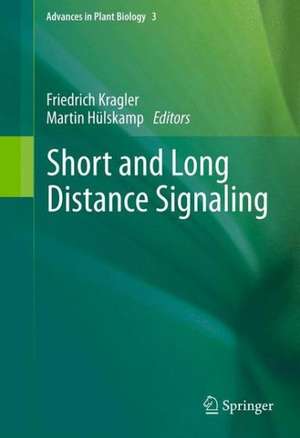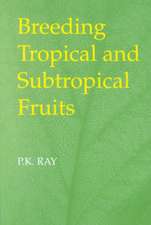Short and Long Distance Signaling: Advances in Plant Biology, cartea 3
Editat de Friedrich Kragler, Martin Hülskampen Limba Engleză Paperback – 3 mar 2014
| Toate formatele și edițiile | Preț | Express |
|---|---|---|
| Paperback (1) | 939.46 lei 6-8 săpt. | |
| Springer – 3 mar 2014 | 939.46 lei 6-8 săpt. | |
| Hardback (1) | 942.63 lei 6-8 săpt. | |
| Springer – 6 dec 2011 | 942.63 lei 6-8 săpt. |
Preț: 939.46 lei
Preț vechi: 1145.68 lei
-18% Nou
Puncte Express: 1409
Preț estimativ în valută:
179.82€ • 195.39$ • 151.15£
179.82€ • 195.39$ • 151.15£
Carte tipărită la comandă
Livrare economică 21 aprilie-05 mai
Preluare comenzi: 021 569.72.76
Specificații
ISBN-13: 9781489988850
ISBN-10: 1489988858
Pagini: 196
Ilustrații: VIII, 188 p.
Dimensiuni: 155 x 235 x 10 mm
Greutate: 0.27 kg
Ediția:2012
Editura: Springer
Colecția Springer
Seria Advances in Plant Biology
Locul publicării:New York, NY, United States
ISBN-10: 1489988858
Pagini: 196
Ilustrații: VIII, 188 p.
Dimensiuni: 155 x 235 x 10 mm
Greutate: 0.27 kg
Ediția:2012
Editura: Springer
Colecția Springer
Seria Advances in Plant Biology
Locul publicării:New York, NY, United States
Public țintă
ResearchCuprins
Viral studies point the way: Mechanisms of intercellular transport.- Embryogenesis as a model system to dissect the genetic and developmental regulation of cell-to-cell transport via plasmodesmata.- Function and Identification of Mobile Transcription Factors.- Cell-to-cell Movement of Homeodomain Transcription Factors: Yesterday, Today and Tomorrow.- Mechanism of small RNA Movement.- Long-distance Signaling by small RNAs.- Signaling and Phloem-Mobile Transcripts.
Notă biografică
Dr. Kragler is lecturer of plant cell biology at the University of Vienna and the University of Potsdam. After his postdoctorial research as a Schrödinger Fellow in the laboratory of W.J. Lucas at UC-Davis and as group leader at the Max. F. Perutz Laboratories in Vienna, Dr. Kragler joined in 2011 the Max Planck Institute for Molecular Plant Physiology in Golm, Germany. The main research topic of his group is on the function of intercellular transport of proteins and RNA in plants.
Dr. Hülskamp holds a Full Professorship at the Botanical Institute, University of Cologne. He did his PhD on developmental biology of Drosophila melanogaster and changed the topic during his postdoctoral time at the University of Munich working with G. Jürgens and Harvard University in the laboratory of R. Pruitt. In 1994 he joined the ZMBP University of Tübingen as a group leader and accepted the current position as a Full Professor in 1999. His main research interest is the intercellular communication between plant cell in the context of developmental processes.
Dr. Hülskamp holds a Full Professorship at the Botanical Institute, University of Cologne. He did his PhD on developmental biology of Drosophila melanogaster and changed the topic during his postdoctoral time at the University of Munich working with G. Jürgens and Harvard University in the laboratory of R. Pruitt. In 1994 he joined the ZMBP University of Tübingen as a group leader and accepted the current position as a Full Professor in 1999. His main research interest is the intercellular communication between plant cell in the context of developmental processes.
Textul de pe ultima copertă
The ability of plants to exchange RNA molecules and transcription factors between cells and tissues is a relatively recent discovery. However, all areas of research such as plant development, metabolism, and plant pathogen interactions now realize the importance of this phenomenon. In this book, experts from the field of intercellular transport deal with various aspects on intercellular transport of viruses and plant endogenous macromolecules such as transcription factors, small silencing-induced and micro RNAs, and other RNAs and their function as signals. The aim of the book is to provide the basic information on the cell-to-cell transport mechanism and to give an overview of the current knowledge of this relatively new field of research. To quote the words of W.J. Lucas “…pioneering discoveries in this field of cell-to-cell and long-distance signaling should certainly entice talented young scholars to join this frontier area of plant biology” . He is certainly right as we got only a first glimpse on the cellular factors regulating intercellular transport and the functional diversity of the ever-increasing number of proteins and RNA molecules found to move between cells.
About the Author:
Dr. Kragler is lecturer of plant cell biology at the University of Vienna and the University of Potsdam. After his postdoctorial research as a Schrödinger Fellow in the laboratory of W.J. Lucas at UC-Davis and as group leader at the Max. F. Perutz Laboratories in Vienna, Dr. Kragler joined in 2011 the Max Planck Institute for Molecular Plant Physiology in Golm, Germany. The main research topic of his group is on the function of intercellular transport of proteins and RNA in plants.
Dr. Hülskamp holds a Full Professorship at the Botanical Institute, University of Cologne. He did his PhD on developmental biology of Drosophila melanogaster and changed the topic during his postdoctoral time at theUniversity of Munich working with G. Jürgens and Harvard University in the laboratory of R. Pruitt. In 1994 he joined the ZMBP University of Tübingen as a group leader and accepted the current position as a Full Professor in 1999. His main research interest is the intercellular communication between plant cell in the context of developmental processes.
About the Author:
Dr. Kragler is lecturer of plant cell biology at the University of Vienna and the University of Potsdam. After his postdoctorial research as a Schrödinger Fellow in the laboratory of W.J. Lucas at UC-Davis and as group leader at the Max. F. Perutz Laboratories in Vienna, Dr. Kragler joined in 2011 the Max Planck Institute for Molecular Plant Physiology in Golm, Germany. The main research topic of his group is on the function of intercellular transport of proteins and RNA in plants.
Dr. Hülskamp holds a Full Professorship at the Botanical Institute, University of Cologne. He did his PhD on developmental biology of Drosophila melanogaster and changed the topic during his postdoctoral time at theUniversity of Munich working with G. Jürgens and Harvard University in the laboratory of R. Pruitt. In 1994 he joined the ZMBP University of Tübingen as a group leader and accepted the current position as a Full Professor in 1999. His main research interest is the intercellular communication between plant cell in the context of developmental processes.
Caracteristici
The recent progress on the isolation and characterization of a number of plasmodesmal proteins will lead to rapid advances in this field of study, and this book,as well as, the opportunity for pioneering discoveries in the field of cell-to-cell and long-distance signaling should certainly entice talented young scholars to join this frontier area of plant biology Includes supplementary material: sn.pub/extras







